How to Stay Patient With Family During Stressful Holidays
Introduction
The holidays are supposed to be joyful — a time of love, laughter, and togetherness. But for many people, they bring something else entirely: pressure, exhaustion, and emotional landmines. Between crowded dinners, unspoken tensions, and old family patterns resurfacing, it’s no wonder that even the most centered person can feel their patience wearing thin.
If you’ve ever found yourself taking deep breaths in the kitchen to avoid snapping, or feeling your chest tighten before a family gathering, you’re not alone. The holiday season activates multiple layers of stress — social, emotional, financial, and sensory — all at once.
But here’s the good news: you can train your body and mind to stay grounded, calm, and compassionate even when things get tense. In this article, we’ll explore the science of holiday stress, practical mindset shifts, and natural supplements that support patience and emotional regulation so you can move through family chaos with grace instead of burnout 🌿.
Looking for supplements for This? Click here.
The Hidden Biology of Holiday Stress 🧠🎁
Every stressful family moment — whether it’s an argument at the dinner table or the pressure to “keep everyone happy” — triggers the same biological response as physical danger.
Your amygdala, the brain’s emotional alarm system, perceives threat and activates the fight-or-flight response. Adrenaline rises, heart rate quickens, and cortisol floods your bloodstream. This is useful if you’re escaping danger — but not so helpful when your uncle brings up politics again.
Meanwhile, your prefrontal cortex — the rational, calm part of your brain — temporarily goes offline. This makes it harder to communicate thoughtfully, empathize, or pause before reacting. That’s why you might later regret things you said in the heat of the moment.
The key to staying patient isn’t suppressing your feelings — it’s keeping your nervous system balanced enough that you can respond from calm awareness instead of emotional reactivity.
Why Family Triggers Feel So Strong 💥
Family gatherings can bring out old emotional patterns because the brain stores early experiences as implicit memories — sensory and emotional imprints that live beneath conscious thought.
When you return to your family environment, smells, tones of voice, and dynamics can unconsciously activate those old neural pathways. You might feel anxious, defensive, or inadequate without understanding why.
This isn’t weakness — it’s conditioning. The nervous system remembers. The goal isn’t to “get over it” but to recognize what’s happening, breathe through it, and use tools that support regulation on both psychological and biochemical levels.
Step One: Prepare Your Nervous System Before You Go 🌬️
Patience during stressful holidays starts before you walk through the door. The calmer and more nourished your nervous system is, the more resilient you’ll be when tension rises.
In the days leading up to family events, focus on:
Getting enough sleep (7–9 hours for emotional regulation).
Eating balanced meals with protein and healthy fats.
Hydrating — dehydration raises cortisol.
Taking supplements that stabilize mood and reduce stress reactivity.
When your baseline is steady, you’re less likely to get thrown off by triggers. Let’s explore some nutrients that help.
Supplements That Support Calm and Patience 🌿✨
Magnesium Glycinate — The Soothing Mineral
Magnesium plays a crucial role in nervous system relaxation. It supports GABA activity, lowers cortisol, and helps your muscles release tension.
During stressful holidays, magnesium deficiency can make you more irritable, anxious, and reactive. Supplementing with magnesium glycinate or threonate helps restore calm and patience.
It’s best taken daily in the evening, as it also supports better sleep — the foundation of emotional stability.
L-Theanine — The “Calm Clarity” Amino Acid
L-theanine, found naturally in green tea, promotes relaxation without drowsiness. It increases alpha brain waves, which foster a state of peaceful focus — exactly what you need when navigating complex family dynamics.
It also reduces physiological markers of stress like heart rate and cortisol.
Take 100–200 mg before gatherings to enhance calm concentration and keep conversations smooth, even when tensions rise 🍵.
Ashwagandha — The Adaptogen of Emotional Balance
The adaptogenic herb Ashwagandha helps the body adapt to stress by modulating the hypothalamic–pituitary–adrenal (HPA) axis. It reduces cortisol spikes while supporting mental clarity.
Regular use has been shown to lower anxiety and improve emotional regulation. It’s particularly helpful for people who feel both fatigued and overstimulated during the holidays.
A typical dose is 300–600 mg of a standardized extract daily.
Rhodiola Rosea — Energy and Emotional Stability
If the holidays leave you drained yet tense, Rhodiola rosea offers balanced support. It enhances resilience to stress, stabilizes dopamine and serotonin, and fights fatigue without overstimulation.
By regulating neurotransmitters, Rhodiola helps prevent emotional crashes and mood swings — the kind that turn small conflicts into big blow-ups.
B-Complex Vitamins — Fuel for Emotional Control
Your brain burns through B-vitamins under stress. B6, B9, and B12 are crucial for synthesizing serotonin and dopamine — neurotransmitters tied to mood and patience.
Deficiency in these vitamins can lead to irritability, brain fog, and low energy. A high-quality B-complex ensures your brain has the nutrients it needs to stay centered and positive during demanding family events.
Omega-3 Fatty Acids — Fluid Thinking and Compassion
Omega-3s (EPA and DHA) strengthen neuronal membranes and improve emotional regulation. They make your brain more flexible — literally.
When neural pathways are well-oiled, you’re better able to pause before reacting and choose empathy over defensiveness.
Taking 1000–2000 mg of EPA + DHA daily can support mood, focus, and overall calm.
Lemon Balm and Chamomile — The Gentle Soothers
Herbal relaxants like lemon balm and chamomile can help you decompress before or after family gatherings. They activate GABA receptors, promoting peace without sedation.
Sipping a warm cup of chamomile tea before bed after a long holiday evening helps your nervous system reset — a ritual of comfort and release 🌼.
Looking for supplements for This? Click here.
Breathwork and Emotional Regulation During the Moment 🌬️💓
Even with the best supplements, stressful moments will happen. Breathwork is your fastest way to restore calm because it directly communicates with the vagus nerve — your body’s relaxation switch.
Try this technique whenever you feel tension rising:
Inhale through your nose for 4 seconds, exhale slowly through your mouth for 6 seconds.
Longer exhalations signal safety to the nervous system, lowering heart rate and blood pressure. Combine this with gentle awareness of your surroundings — the colors, sounds, or textures nearby — to ground yourself in the present moment.
This isn’t avoidance; it’s nervous system regulation. You’re giving your body permission to stay anchored while emotions move through.
Want to try Breathwork? Click Here.
Understanding the Psychology of Family Triggers 💭
Staying patient with family is often less about the current situation and more about old emotional scripts.
Maybe you revert to feeling like a child around your parents, or find yourself over-explaining to be heard. These patterns aren’t conscious choices — they’re stored responses designed to keep you safe in the past.
Noticing when these scripts arise is a form of emotional mastery. Each time you pause and respond differently, you’re rewiring your brain for peace.
Remind yourself gently: “This isn’t about me now — it’s about something old. I can choose a new way to respond.”
That single breath of awareness can turn conflict into compassion.
Using Mindset to Stay Centered ❤️
Supplements support your biochemistry, but mindset anchors your behavior. The most powerful mindset shifts for family patience are rooted in empathy and boundaries.
Accept that imperfection is inevitable.
Holiday gatherings bring together people with different histories, values, and emotional maturity levels. Expecting total harmony only creates frustration.
Focus on connection, not correction.
You don’t have to fix anyone. Listen more, react less, and find moments of humor or shared warmth.
Protect your energy with gentle boundaries.
If certain conversations or relatives always cause stress, it’s okay to step away — go for a walk, check on dessert, or simply breathe in another room.
Boundaries are not rejection; they’re self-respect.
Choose softness over control.
When you stop trying to manage every interaction, you create space for real connection.
Supporting the Body After Stressful Gatherings 🌙
Even after the event, your body might still be in a mild stress state. You may notice fatigue, tight shoulders, or a mental “hangover.”
Post-holiday self-care is essential.
Take magnesium before bed to relax your muscles and nervous system. Replenish hydration with electrolytes or coconut water. Nourish yourself with a protein-rich meal to restore blood sugar balance.
Sleep early, journal your thoughts, or take a warm Epsom salt bath to release tension.
These simple rituals teach your nervous system that it’s safe to rest again.
When Emotions Feel Overwhelming 💫
If you find yourself feeling tearful, detached, or overstimulated after family events, remind yourself that this is nervous system overload, not weakness.
Your body is processing more sensory and emotional input than usual.
Ground yourself with physical sensations: notice your feet, hold a comforting object, or step outside for fresh air. Supplements like magnesium or L-theanine can help stabilize your system during this decompression period.
You don’t have to “snap out of it.” You’re recalibrating. That’s healing in progress.
The Long-Term View: Building Emotional Resilience 💪💞
Patience isn’t about suppressing emotion; it’s about expanding your capacity to stay calm while feeling it. This capacity — called window of tolerance — can grow over time with consistent support.
Each time you stay grounded in a stressful moment, your nervous system learns safety. Each time you recover with rest and nourishment, it builds resilience.
Supplements, breathwork, and mindfulness aren’t quick fixes — they’re scaffolding for a stronger foundation of peace.
When you nurture your biology and psychology together, you transform not just your holidays, but your everyday relationships.
Turning Family Time Into a Grounding Practice 🌲
Instead of seeing family gatherings as something to endure, you can reframe them as opportunities to practice nervous system mastery.
Each trigger becomes a chance to notice, breathe, and respond differently. Each conversation becomes a test of presence.
You’re not here to prove you’ve “healed.” You’re here to practice compassion — for others, and for yourself.
That’s what true patience looks like: not perfection, but peaceful persistence.
Supplements + Mindset = Calm Connection 🧘🌿
When your body feels supported, your brain has the resources to stay patient. Magnesium keeps your nerves relaxed, L-theanine softens anxious edges, and adaptogens like ashwagandha or rhodiola rebuild stress resilience.
Combine these with breath awareness, realistic expectations, and gentle self-boundaries, and you’ll notice a profound shift — not only in how you handle holiday stress but in how you relate to your loved ones all year long.
Patience doesn’t mean pretending everything’s fine. It means being the calm within the storm — and realizing that even when others lose their center, you can keep yours 🌟.
A Gentle Reminder 💛
You can’t control other people’s behavior, but you can influence the emotional atmosphere through your own regulation. Your calm nervous system is contagious — when you stay grounded, it helps others settle too.
Even small acts of awareness — pausing before responding, choosing compassion over sarcasm, stepping away to breathe — are powerful.
Over time, these micro-moments build trust and soften old dynamics.
The holidays may never be perfectly peaceful, but they can become deeply human — full of warmth, imperfection, and genuine connection.
And that’s more than enough 🎄💫.
Looking for online therapy ? Click Here.
References
Kennedy, D. O. (2016). “Cognitive nutrition and stress resilience.” Frontiers in Neuroscience, 10: 23.
Boyle, N. B., et al. (2017). “The role of magnesium in stress regulation.” Nutrients, 9(5): 429.
Panossian, A., & Wikman, G. (2010). “Adaptogens and neurochemical balance.” Phytomedicine, 17(6): 481–493.
Kimura, K., et al. (2007). “L-theanine and relaxation under stress.” Biological Psychology, 74(1): 39–45.
Lopresti, A. L., et al. (2019). “Ashwagandha and emotional resilience.” Medicine (Baltimore), 98(37): e17186.
Reay, J. L., et al. (2006). “Rhodiola rosea and cognitive-emotional performance under stress.” Phytotherapy Research, 20(8): 665–672.
Benton, D. (2010). “B vitamins and emotional regulation.” Nutrition Reviews, 68(10): 585–601.
Hibbeln, J. R., et al. (2018). “Omega-3 fatty acids and emotional regulation.” Progress in Neuro-Psychopharmacology & Biological Psychiatry, 80: 109–117.
Lanius, R. A., et al. (2018). The Neurobiology and Treatment of Trauma-Related Dissociation. Routledge.
van der Kolk, B. A. (2014). The Body Keeps the Score. Viking.
Related Posts
-
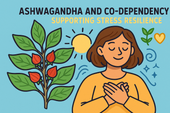
Ashwagandha and Co-Dependency: Supporting Stress Resilience
Stress is more than a feeling—it’s a full-body signal that your system is overwhelmed. When the mind races and the body tenses, your hormones, breathing, and focus all shift into survival mode. Chronic stress doesn’t just affect emotions—it reshapes your nervous system, drains your energy, and clouds your clarity. Learning to understand and manage stress gently is the first step toward peace, balance, and true recovery. 🌿💫
-

Why Co-Dependency Feels Draining: Adrenal Fatigue and Supplements That Help
The adrenal glands are small but powerful organs that sit above your kidneys, acting as your body’s built-in stress managers. They produce hormones like cortisol and adrenaline that help regulate energy, mood, and resilience. When they’re overworked from chronic stress or emotional exhaustion, fatigue and imbalance follow. Supporting adrenal health naturally can help restore calm, energy, and hormonal balance. 🌿⚡
-

The Link Between Anxiety, Co-Dependency, and Natural Support
Anxiety feels like living in constant alert mode—your heart races, your thoughts loop, and your body can’t find peace. It’s the nervous system’s way of preparing for danger, even when none exists. Understanding what’s happening in your mind and body is the first step toward calming the storm and restoring balance. 🌿💫
-

Supplements That Support Dopamine and Serotonin in Co-Dependent Patterns
Serotonin is the neurotransmitter of calm, confidence, and contentment. When it’s balanced, you feel peaceful and emotionally grounded. When it’s low, anxiety, mood swings, and emotional dependence take over. By understanding serotonin’s role in emotional health—and how to support it naturally—you can rebuild inner stability, improve relationships, and cultivate lasting happiness from within. 🌞💫
-

How Emotional Exhaustion in Codependency Impacts the Nervous System
The nervous system is the body’s communication network, connecting the brain to every organ and muscle. It regulates stress, mood, and emotion through a delicate balance of electrical and chemical signals. When overwhelmed, it can become dysregulated—leading to fatigue, anxiety, and emotional imbalance. Understanding how to calm and strengthen the nervous system is key to healing from chronic stress and emotional burnout. ⚡🌿
-

What Is Co-Dependency? The Role of Brain Chemistry and Stress
Stress is more than a feeling—it’s a full-body experience that begins in the brain and ripples through every cell. When cortisol surges and the nervous system stays on alert, your body can’t rest or recover. Over time, this constant tension affects energy, focus, mood, and even immune health. Understanding stress chemistry is the first step toward breaking free from burnout and finding calm again. 🌿
-

Creating a Supplement Stack for Motivation, Energy, and Anti-Procrastination
Motivation is the fuel behind every meaningful achievement—but it’s not just about willpower. It’s a mix of mindset, brain chemistry, and momentum. When energy, focus, and purpose align, action feels natural instead of forced. Learn how to harness motivation as a daily state, not a fleeting feeling.
-

Supplements for Building Consistency and Reducing Chronic Procrastination
Biochemistry is the bridge between biology and chemistry—the science of life at the molecular level. It explains how nutrients, hormones, and neurotransmitters interact to create energy, thought, and emotion. From brain function to muscle movement, biochemistry reveals the invisible processes that sustain health, balance, and vitality.
-

GABA and Procrastination: Supporting Calm Focus for Productivity
GABA is the brain’s natural calming messenger—a neurotransmitter that helps slow mental overactivity and ease stress. When GABA levels drop, focus fades, anxiety rises, and procrastination becomes more likely. By supporting GABA through nutrition, lifestyle, and supplements, you can restore calm clarity, improve focus, and take action with steady, balanced energy.
-

Ashwagandha and Procrastination: Lowering Stress to Improve Action
Science is the language of curiosity and discovery. It helps us understand the hidden patterns behind life, energy, and the universe. Through experimentation and critical thinking, science connects imagination to evidence—turning questions into knowledge. Whether through microscopes, molecules, or minds at work, science represents our endless pursuit of truth and innovation.
-

Neurotransmitters and Motivation: Supplements That Support Drive and Focus
Supplements can do more than boost physical health—they can also enhance mental clarity, focus, and motivation. Nutrients like omega-3s, magnesium, B vitamins, and adaptogens help balance neurotransmitters, stabilize mood, and support brain energy. When combined with good sleep, nutrition, and mindful habits, they can transform how your brain performs under stress.
-

How Stress Hormones Like Cortisol Fuel Procrastination (and What Helps)
Blood sugar isn’t just about physical health—it directly impacts focus, mood, and motivation. When glucose levels spike and crash, energy and attention do the same, fueling procrastination and brain fog. Learning how to stabilize blood sugar through balanced meals, mindful habits, and key nutrients helps keep your mind steady, focused, and ready to act.
-

Brain Fog and Procrastination: Supplements for Mental Clarity
Brain fog can turn even simple tasks into mental hurdles. When your thoughts feel slow and unclear, procrastination often follows—making focus and productivity seem impossible. This article explores the biochemical and lifestyle causes of brain fog and reveals the most effective supplements for restoring mental clarity, focus, and sustained energy.
-

The Link Between Low Energy and Procrastination: Can Supplements Help?
Neurochemistry shapes how we think, feel, and act. When neurotransmitters like dopamine, serotonin, and GABA fall out of balance, it can lead to fatigue, anxiety, or lack of motivation—fueling procrastination and low mood. Understanding the brain’s chemical communication system helps us find ways to restore focus, calm, and emotional stability through nutrition, mindfulness, and targeted supplements.
-

Why Do We Procrastinate? The Role of Dopamine and Supplements That Support It
Dopamine is the brain’s motivation messenger—the chemical that fuels focus, reward, and drive. When dopamine levels drop, even simple tasks can feel impossible to start. This article explores how dopamine shapes procrastination, motivation, and mental energy, along with natural supplements and daily habits that help restore balance and get things done.
-

Phosphatidylserine and Stress Reduction for People with BDD
Stress is more than a mental state—it’s a full-body experience that affects hormones, brain chemistry, and emotional balance. For people with Body Dysmorphic Disorder (BDD), constant tension and worry about appearance can overload the nervous system. Learning how stress works and finding ways to calm it is key to breaking the cycle of anxiety and self-criticism.
-

How Antioxidants Like Vitamin C & E Support Mental Health in BDD
Antioxidants are the body’s natural defense against stress and inflammation. For people with Body Dysmorphic Disorder (BDD), oxidative stress can worsen fatigue, anxiety, and emotional imbalance. Nutrients like Vitamin C and E help protect brain cells, boost neurotransmitter function, and support a calmer, clearer mindset—building a stronger foundation for recovery.
-

Ginkgo Biloba and Memory Support for BDD Recovery
Emotional regulation is the foundation of healing from Body Dysmorphic Disorder (BDD). When the nervous system stays in constant overdrive, even small stressors can trigger self-critical spirals. Learning to calm emotional reactivity helps restore clarity, confidence, and a sense of inner balance. By blending mindfulness, nervous system support, and self-compassion, you can retrain your brain to respond—not react—to emotion.
-

Alpha GPC and Cognitive Function in Body Dysmorphic Disorder
Mental fatigue can feel like your brain has hit a wall—thoughts slow down, focus fades, and motivation disappears. For people with Body Dysmorphic Disorder (BDD), chronic overthinking, emotional stress, and constant self-evaluation can deplete mental energy even further. Understanding what causes this cognitive exhaustion is the first step toward recovery—through rest, balanced nutrition, and targeted brain-supporting supplements.
-

N-Acetyl L-Tyrosine and BDD: Supporting Mental Clarity
Chronic stress doesn’t just affect your mood—it reshapes your brain chemistry, weakens focus, and fuels the obsessive thought loops common in Body Dysmorphic Disorder (BDD). Over time, constant cortisol elevation drains mental energy and emotional balance. Learning to recognize and manage chronic stress is essential to restoring mental clarity, self-compassion, and resilience.
-

Chamomile and Lavender for Calming Obsessive Body Image Thoughts
The nervous system is the command center of our emotional and physical world—and in Body Dysmorphic Disorder (BDD), it often operates in overdrive. Understanding how the brain and body communicate under stress reveals why intrusive thoughts feel uncontrollable. Learning to regulate the nervous system through calm practices, nutrition, and supplements helps restore inner balance and emotional safety.
-

Adaptogens for Body Dysmorphic Disorder: Rhodiola, Ginseng, and More
Rhodiola rosea, often called the “golden root,” is an adaptogenic herb renowned for boosting stress resilience and mental endurance. For individuals with Body Dysmorphic Disorder (BDD), Rhodiola may help reduce fatigue, regulate cortisol, and enhance emotional balance. By supporting both mind and body, this powerful plant promotes calm focus, improved mood, and renewed energy to face daily challenges.
-

B Vitamins for Stress Resilience in BDD: Rebuilding Calm from Within
Biochemistry is at the heart of every thought, emotion, and reaction we experience. In Body Dysmorphic Disorder (BDD), chemical imbalances in neurotransmitters like serotonin, dopamine, and GABA can amplify stress and distort self-perception. Understanding the biochemistry behind mood and stress regulation offers a path toward healing—bridging the gap between emotional experience and the body’s molecular balance.
-

Melatonin and Body Dysmorphic Disorder: Restoring Healthy Sleep Patterns
Melatonin, the body’s natural sleep hormone, plays a vital role in helping people with Body Dysmorphic Disorder (BDD) restore healthy sleep cycles. When anxiety and obsessive thinking interfere with rest, melatonin levels often drop, leading to more emotional reactivity and distorted self-perception. This article explores how melatonin works, why BDD disrupts it, and how natural supplementation—combined with mindful routines—can help the brain and body finally find calm at night.
-

Sleep Struggles with BDD: Supplements for Rest and Recovery
When you’re living with Body Dysmorphic Disorder (BDD), restful sleep can feel impossible—but the right supplements can help reset your body’s natural rhythm. From magnesium and L-theanine to 5-HTP and ashwagandha, these nutrients support relaxation, lower cortisol, and enhance melatonin production. This article explores how supplements can calm the mind, ease nighttime anxiety, and promote true restorative sleep for emotional and physical recovery.
-

5-HTP and Serotonin Balance: Could It Help with Body Dysmorphic Disorder?
Anxiety can feel like a storm inside the mind—restless, overwhelming, and hard to control. In people with Body Dysmorphic Disorder (BDD), anxiety often fuels obsessive thoughts and self-criticism, creating a painful cycle of worry and self-doubt. This article explores the biological roots of anxiety, the role of neurotransmitters like serotonin and GABA, and how natural strategies such as mindfulness, supplements, and nervous system regulation can restore calm and mental clarity.
-

Can Ashwagandha Help Ease Stress and Anxiety in Body Dysmorphic Disorder?
Neurotransmitters like serotonin, dopamine, GABA, and acetylcholine are the chemical messengers that shape how we think, feel, and react to stress. In Body Dysmorphic Disorder (BDD), imbalances in these neurotransmitters can amplify anxiety, obsessive thinking, and emotional distress. This article explores how restoring healthy brain chemistry through nutrition, supplements, and mindfulness can help bring clarity, calm, and emotional stability.
-

L-Theanine for BDD: Finding Calm in the Mind
Neurochemistry plays a central role in how we think, feel, and see ourselves. For those living with Body Dysmorphic Disorder (BDD), imbalances in neurotransmitters like serotonin, dopamine, and GABA can intensify anxiety, obsessive thoughts, and emotional distress. This article explores how regulating brain chemistry through supplements, mindfulness, and lifestyle changes can bring the nervous system back into harmony and restore inner calm.
-

Omega-3 Fatty Acids and Body Image Disorders: Supporting Emotional Health
Omega-3 fatty acids do far more than support heart health—they nourish the brain, stabilize mood, and may ease the emotional turbulence tied to body image disorders like BDD. This in-depth article explores how omega-3s regulate serotonin, dopamine, and inflammation, helping individuals reduce obsessive thoughts and rebuild self-acceptance. It also connects nutrition to therapy, mindfulness, and nervous system balance for holistic emotional healing.
-

Magnesium and BDD: Calming an Overactive Nervous System
Magnesium plays a crucial role in calming an overactive nervous system—something people with Body Dysmorphic Disorder (BDD) struggle with daily. This article explores how magnesium supports relaxation, emotional regulation, and stress reduction while diving into the science behind its connection to brain chemistry. It also examines how combining magnesium supplementation with therapy and breathwork can help rebalance the body’s stress response, reduce obsessive thought patterns, and promote lasting nervous system calm.
-

The Gut-Brain Axis and BDD: Why Probiotics Might Matter
The gut and brain are constantly in conversation — and that dialogue may shape how you experience Body Dysmorphic Disorder. By nurturing your microbiome with probiotics, prebiotics, and gut-healing nutrients, you can help rebalance serotonin, calm anxiety, and restore emotional stability from within 🧠🦠.
-
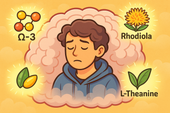
Brain Fog and Body Dysmorphic Disorder: Can Nootropic Supplements Help?
Brain fog often accompanies Body Dysmorphic Disorder, clouding focus and deepening emotional fatigue. Nootropic supplements like L-theanine, Rhodiola, and CoQ10 can help restore mental clarity, balance neurotransmitters, and bring calm energy back to the mind 🌿🧠.
-

How Stress Hormones Like Cortisol May Worsen Body Dysmorphic Disorder
Chronic stress floods the brain with cortisol — the hormone that keeps you on high alert. In Body Dysmorphic Disorder, this chemical overdrive fuels anxiety, distorts self-image, and traps the body in survival mode. Calming cortisol helps restore both peace and perspective 🌿🧠.
-

The Role of Neurotransmitters in BDD—and How Supplements May Help
Neurotransmitters like serotonin, dopamine, glutamate, and GABA shape how people with Body Dysmorphic Disorder perceive themselves. When these brain messengers fall out of balance, perception distorts — but targeted supplements can help restore calm, focus, and emotional regulation 🧠🌿.
-

What Is Body Dysmorphic Disorder? A Deeper Look at the Mind-Body Connection
Body Dysmorphic Disorder (BDD) isn’t just about appearance — it’s about perception. When brain chemistry, trauma, and stress distort self-image, the mind begins to see flaws that aren’t truly there. Healing starts by calming the nervous system and reconnecting mind and body 🪞🧠.
-
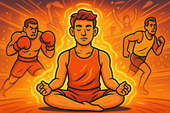
Keeping Calm in Competitive Sports: How to Train Your Mind, Body, and Chemistry for Peak Performance
Competitive pressure can overwhelm even the strongest athletes — but calm is trainable. By combining supplements like magnesium, L-theanine, and adaptogens with breathwork and mindset training, you can stay focused, balanced, and in control under any level of stress 🧠🏅.
-
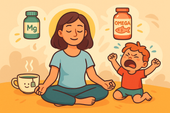
Supplements for Parents Facing Toddler Tantrums: Staying Calm When Little Emotions Run Wild
Toddler tantrums can drain even the most loving parent — but your calm is powerful. With the right supplements like magnesium, L-theanine, and ashwagandha supporting your nervous system, you can stay patient, grounded, and kind, even when emotions run high 🧸🌿.
-

Workplace Stress and Anger Management Support
Workplace stress can quickly turn into frustration — but calm is a skill you can train. By combining supplements like magnesium, L-theanine, and adaptogens with breathwork and mindset tools, you can stay focused, patient, and emotionally grounded no matter how intense the office gets 💼🌿.
-

Supplements to Keep Calm During Traffic Jams
Getting stuck in traffic doesn’t have to ruin your mood. With calming supplements like magnesium, L-theanine, and ashwagandha, you can train your body to stay relaxed and focused behind the wheel — turning gridlock into a moment of grounded patience 🚗🌿.
-
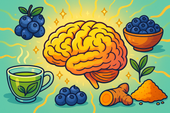
The Role of Antioxidants in Healing Brain Stress from Dissociation
Antioxidants protect the brain from the oxidative stress caused by trauma and dissociation. By neutralizing free radicals and supporting mitochondrial recovery, they help restore clarity, focus, and emotional balance — allowing the mind to heal at the cellular level 🌿🧠.
-
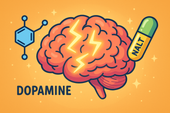
N-Acetyl L-Tyrosine (NALT) for Supporting Mental Clarity
N-Acetyl L-Tyrosine (NALT) fuels dopamine production — the neurotransmitter of focus and motivation. By supporting brain chemistry during stress, NALT helps restore mental clarity, energy, and alertness, making it easier to think clearly and feel present again ⚡🧠.
-

How Ginseng May Improve Focus and Energy in Dissociation
Ginseng helps combat the mental fatigue and fog that often come with dissociation. By supporting mitochondrial energy, balancing neurotransmitters, and regulating cortisol, it gently restores focus, motivation, and emotional presence — helping the mind reconnect with clarity and strength 🌿⚡.
-
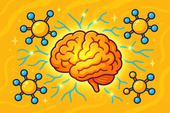
Phosphatidylserine and Dissociation: Supporting Cognitive Function
Phosphatidylserine helps calm the stress response by balancing cortisol, the body’s primary stress hormone. By lowering cortisol spikes, it protects memory, focus, and emotional stability — restoring clarity and mental presence for those struggling with dissociation 🧠🌿.
-
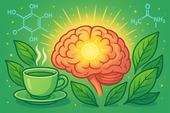
Can Green Tea Extract Help with Dissociative Brain Fog?
Green tea extract may help lift dissociative brain fog by supporting neurotransmitter balance, reducing inflammation, and enhancing energy at the cellular level. With its key compounds EGCG and L-theanine, it promotes calm focus, clarity, and emotional presence — helping you feel more alert and grounded 🍵🧠.
-
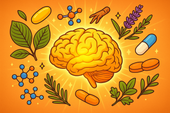
Building a Natural Supplement Stack for Dissociation Support
Building a supplement stack for dissociation means nourishing the brain and body back into communication. By supporting neurotransmitters, gut health, and energy balance through nutrients like magnesium, omega-3s, curcumin, and probiotics, you can help restore clarity, calm, and connection — one layer at a time 🌿🧠.
-

Chamomile and Lavender for Dissociative Anxiety Relief
Chamomile and lavender work together to calm dissociative anxiety by soothing the nervous system and restoring emotional safety. Their natural compounds balance cortisol, enhance GABA activity, and activate the vagus nerve — helping you feel grounded, connected, and at peace again 🌿💜.
-
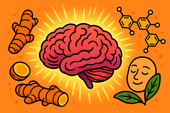
Curcumin for Inflammation and Mental Clarity in Dissociation
Curcumin, the golden compound in turmeric, does more than fight inflammation — it helps clear the mental fog often tied to dissociation. By calming neuroinflammation, balancing neurotransmitters, and supporting mitochondrial energy, curcumin can restore mental clarity, focus, and emotional presence 🌿🧠.
-
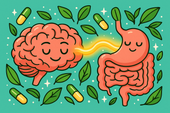
Probiotics and Dissociation: Exploring the Gut–Brain Axis
The gut–brain axis plays a vital role in emotional awareness and presence. When the microbiome is balanced, it supports serotonin production, vagus nerve activity, and calm focus. Probiotics help repair this connection — restoring safety, clarity, and the feeling of truly being in your body again 🌿🧠.
-
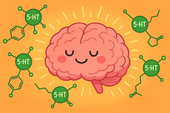
5-HTP for Dissociation: Supporting Serotonin and Emotional Stability
5-HTP helps bridge the gap between emotional numbness and stability by supporting serotonin production — the neurotransmitter that shapes mood, sleep, and sensory awareness. For people experiencing dissociation, 5-HTP may gently restore connection, presence, and emotional balance from the inside out 🌿🧠.

















































